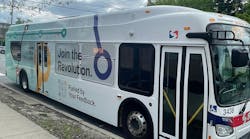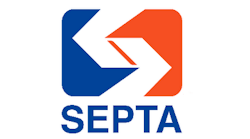One word to describe yourself: Relentless
Alma mater: Villanova University (Bachelor of Arts), University of Pennsylvania (Masters of City and Regional Planning)
Lex Powers is the Southeastern Pennsylvania Transportation Authority’s (SEPTA) first director of information design and has been a champion at SEPTA for clearer, more accessible and more effective communication in transit since he started working as a long-range planner in 2017. In one of his earlier projects, he introduced the authority’s frequency map in 2019, the first illustration of SEPTA’s bus network where bus routes are shown by their frequency of service, allowing riders to easily see which routes come frequently enough for them to just show up and ride like a subway.
Powers began working to redesign and replace 200,000 signs, design a brand new, modern SEPTA website and launch a state-of-the-art app. He oversees the SEPTA Metro: Wayfinding Plan, which will make SEPTA’s physical and digital communication accessible, regardless of language, familiarity or ability. The plan included 13 “pop-up” events to hear 10,000 riders’ experiences and a Reddit AMA that generated more than 30,000 views in 24 hours, allowing riders to ask the project team questions. Another engagement strategy included a partnership with the University of Pennsylvania’s Center for Safe Mobility to shadow new riders, including non-English speakers and those with disabilities, to analyze biometric data at key navigation decision points. As new wayfinding continues to roll out, Powers is leading SEPTA’s new information design practice to translate the success of the plan’s design to communications planning system-wide.
He has been invited to speak nationally and guide transit agencies and advocacy groups to make similar improvements in their transit systems. Additionally, Powers has been featured in various media and print publications. He has positioned himself as a mentor in the Philadelphia community by guiding countless soon-to-be transit professionals and working to get them involved in advocacy and stakeholder groups. He has assembled a team of industry experts and community leaders – including hiring two recent chairs of SEPTA’s Youth Advisory Council (YAC) and the manager of partnerships at the Transit app in Montreal, Quebec, Canada, among others.
An openly gay man in an agency where it is not common, Powers has helped break down barriers internally for people who do not easily conform to typical societal norms. He has prioritized mentoring young transit professionals that identify as women, LGBTQ+ or have identities underrepresented in transit.
Is there a specific experience that led you to where you are today?
I started in SEPTA’s Planning Division, and one of my first projects was getting our bus network redesign off the ground. Despite having good knowledge of our transit network, I could not get a handle of the existing state of our network from a high level. We had timetables, route maps, atlases, etc., but nothing you could glance at and say, “that’s our bus network.” We started designing SEPTA’s first frequency-based bus map. This information did not exist anywhere, and it took a long time and involved a lot of minds both in and outside of SEPTA to complete. Once it was finished we had a better sense of what we were starting with, and as a result, a clearer direction for future improvements.
What do you enjoy most about your job?
I went into transit planning because I wanted to have a positive impact on my hometown. To be honest, I never dreamed that I would be given the chance to make an impact this large. After moving into SEPTA’s Communications Division, my job has been about teaching people something new about our transit network. It is huge and frequent. We’ve got people who live and work above subway stations and don’t even know it. That is both amusing and concerning, but it’s also where the opportunity lies when it comes to future ridership growth, and the benefits it unlocks for the region.
What’s the most challenging part of your job?
In the same way that impact is the “best” part of the job, the visibility that comes alongside it is the hardest. I am in this line of work because I wanted to do right by Philly, and for that reason, hearing negative feedback is particularly challenging. Any change we make – even if it’s a good thing – it’s not going to go unnoticed, and our riders aren’t the type to keep opinions to themselves. Ultimately we’ve tried to turn that into an opportunity – we’ve built lines of communication with our riders, advocates and stakeholders, and we’ve tried to incorporate their feedback whenever possible. The result is hopefully something we can all feel ownership over.
Accomplishment you’re most proud of and why?
To me, everything still feels unfinished, so it’s hard to call anything an accomplishment. I will say that I am especially proud of the movement that has come from this project so far – we have fans designing maps and renderings using the new concepts, advocates using the nomenclature to explain service levels and desired improvements. Now I’ve got a team of people who are a lot smarter than me and supporters who are a lot more knowledgeable. I have tried to be a conduit for other people’s ideas rather than a promoter of my own.
Best advice/tip/best practice to share from your area of expertise?
Half measures availed us nothing. If you’re going to do it, do it. If you’re going to say it, say it. Whenever I get scared (which is often!), I remind myself that this is a rare opportunity. I didn’t come this far to waste it.

Brandon Lewis | Associate Editor
Brandon Lewis is a recent graduate of Kent State University with a bachelor’s degree in journalism. Lewis is a former freelance editorial assistant at Vehicle Service Pros.com in Endeavor Business Media’s Vehicle Repair Group. Lewis brings his knowledge of web managing, copyediting and SEO practices to Mass Transit Magazine as an associate editor.





